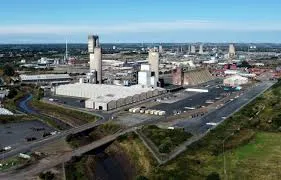
Dec . 24, 2024 14:52 Back to list
NPK Fertilizer Manufacturing Facility for Sustainable Agriculture Solutions
Understanding NPK Fertilizer Production Plants An Essential Component of Modern Agriculture
NPK fertilizers, which contain Nitrogen (N), Phosphorus (P), and Potassium (K), are crucial for boosting crop yield and ensuring food security worldwide. The production of NPK fertilizers is a significant industrial operation, combining chemical processes and agricultural science to create nutrient-rich products that support plant growth. In this article, we will explore the importance of NPK fertilizer production plants, their working processes, and the challenges they face in modern agriculture.
The Importance of NPK Fertilizers
NPK fertilizers represent a formulated balance of the three fundamental nutrients essential for plant growth. Nitrogen is vital for leaf production and overall plant vigor; phosphorus supports root development and flowering; and potassium regulates water retention and enhances drought resistance. The balanced provision of these nutrients allows farmers to optimize soil fertility, resulting in higher yields and better-quality crops.
As the global population continues to grow, and the demand for food escalates, the role of NPK fertilizers in agriculture becomes increasingly critical. These fertilizers not only enhance crop production but also contribute to sustainable farming practices by improving soil health and reducing the need for additional chemical inputs.
The Production Process
The production of NPK fertilizers typically involves several steps, including the synthesis of essential chemicals, granulation, and packaging
.1. Chemical Synthesis The first stage of production begins with the extraction of raw materials. Nitrogen is usually sourced from the atmosphere through processes like the Haber-Bosch method, which combines atmospheric nitrogen with hydrogen to create ammonia. Phosphorus is often derived from phosphate rock, which is processed using sulfuric or nitric acid to create phosphoric acid. Potassium can come from minerals such as potash.
2. Blending and Granulation Once the essential nutrient components have been synthesized, they are carefully blended in precise ratios. This mixing is crucial as different crops require varying amounts of N, P, and K. The blended mixture is then processed through granulation, where it is formed into granules of a specific size. This helps with the even distribution of nutrients when applied to soil.
npk fertilizer production plant

3. Drying and Packaging After granulation, the fertilizer is dried to remove excess moisture—this prevents clumping and ensures a longer shelf life. Finally, the granulated fertilizer is packaged for distribution to retailers and farmers.
Challenges Facing NPK Fertilizer Production Plants
Despite their significance, NPK fertilizer production plants encounter several challenges. Environmental concerns have become increasingly prominent, with the production processes often leading to greenhouse gas emissions and pollution. Striving for more sustainable practices, many plants are now exploring ways to reduce their ecological footprint, such as utilizing waste materials or alternative energy sources.
Furthermore, fluctuations in raw material prices can significantly impact production costs. With fertilizers being heavily reliant on fossil fuels for nitrogen production, changes in the energy market can lead to unpredictable pricing and affect overall accessibility for farmers.
Lastly, regulatory frameworks across different countries can pose a challenge. Compliance with varying environmental regulations and safety standards requires NPK fertilizer production plants to adapt continuously, often necessitating significant investment in technology and processes.
Conclusion
NPK fertilizer production plants play a vital role in supporting global agriculture and food security. As demand for agricultural products intensifies, the effectiveness and sustainability of fertilizer production will be crucial. By embracing innovative technologies and practices, these facilities have the potential to not only contribute to higher crop yields but also to advance towards a more sustainable future in agriculture.
As we move forward, it is essential to continue investing in research, development, and education to ensure that NPK fertilizers are produced in a way that is effective, environmentally friendly, and capable of meeting the needs of the ever-growing global population.
-
10-10-10 Organic Fertilizer - Balanced NPK Formula
NewsAug.02,2025
-
Premium Organic Manure Compost for Eco Gardens
NewsAug.01,2025
-
Organic 10-10-10 Fertilizer | Balanced Plant Nutrients
NewsJul.31,2025
-
Premium Amino Acid Fertilizer | Rapid Plant Growth Booster
NewsJul.31,2025
-
10 10 10 Fertilizer Organic—Balanced NPK for All Plants
NewsJul.30,2025
-
Premium 10 10 10 Fertilizer Organic for Balanced Plant Growth
NewsJul.29,2025
